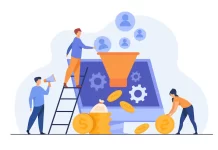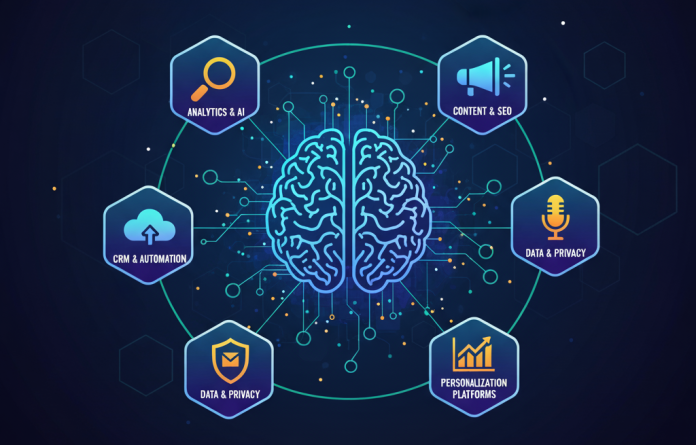“Marketing without data is like driving with your eyes closed.” — Dan Zarrella
B2B marketers can no longer rely on guesswork. Martech tools for B2B marketing 2025 empower businesses to identify high-value leads, track buyer behavior, and deliver campaigns that truly resonate. By focusing on the right audience, marketers ensure every effort drives meaningful engagement and conversions.
At the same time, these tools allow companies to scale campaigns across multiple channels, including email, social media, and web platforms. With automation and AI-driven insights, marketers can reach a larger audience while maintaining personalized, high-impact messaging, optimizing ROI, and accelerating the sales funnel.
Top 10 Martech Tools for B2B Marketing 2025
- HubSpot
- 6sense
- CRM Tools (Salesforce, Zoho, Pipedrive)
- Clay
- Google Analytics 4 (GA4)
- Demandbase
- ChatGPT (OpenAI Tools)
- Surfer SEO
- Semrush
- Customer Relationship Management (Generic term for CRM strategy & tools)
1. HubSpot — All-in-One Growth Hub
What it Does:
HubSpot combines CRM, marketing automation, content management, and analytics in one platform, making it a go-to tool for B2B marketers.
Hidden Features & Tips:
- Custom Code Actions – Automate workflows with personalized logic.
- Lead Rotation Automation – Assign leads automatically based on criteria like geography or engagement.
- AI Content Assistant – Generates blog outlines, meta descriptions, and even A/B test suggestions for emails.
Marketing Hack:
Set behavior-based triggers so leads receive content dynamically. For instance, if someone downloads a whitepaper about ABM strategies, they automatically enter a nurture workflow.
Use Case:
A SaaS company uses HubSpot to score leads dynamically, trigger personalized email sequences, and alert sales teams about hot prospects, improving conversion rates significantly.
2. 6sense — Predictive Intelligence for ABM
What it Does:
6sense leverages AI and intent data to predict which accounts are most likely to buy.
Hidden Features & Tips:
- Intent Signal Analysis – Differentiates between casual researchers and high-intent buyers.
- Real-Time Ad Personalization – Serves account-specific campaigns automatically.
- Sales Alerts – Notifies sales teams when a prospect shows buying intent.
Marketing Hack:
Combine 6sense with HubSpot automation, when a high-intent account is detected, trigger personalized emails and LinkedIn campaigns at the same time.
Use Case:
An enterprise SaaS provider identifies accounts exploring competitor solutions and triggers targeted campaigns, boosting conversion probability.
3. CRM Tools — Beyond Contact Management
What it Does:
CRM platforms like Salesforce, Zoho, and Pipedrive centralize customer data for tracking, engagement, and follow-ups.
Hidden Features & Tips:
- AI-driven deal insights predict which opportunities are most likely to close.
- Social media activity tracking gives context to lead interactions.
- Automated workflows assign tasks based on lead score, geography, or previous behavior.
Marketing Hack:
Integrate CRM with marketing tools to trigger dynamic content delivery, for example, sending case studies to webinar attendees automatically.
Use Case:
A manufacturing B2B firm tracks client interactions and automatically delivers tailored content, increasing engagement and shortening sales cycles.
4. Clay — AI-Powered Lead Enrichment
What it Does:
Clay enriches leads automatically, appending job titles, tech stacks, and social profiles for more accurate targeting.
Hidden Features & Tips:
- Real-time updates keep lead data fresh.
- Dynamic segmentation allows live updates for campaigns.
- Zapier integration triggers workflows automatically post-enrichment.
Marketing Hack:
Enrich leads with technology usage data to personalize outreach. For instance, target leads using Salesforce with content showing your product’s Salesforce integrations.
Use Case:
A recruitment SaaS company enriches lead profiles and automatically triggers email campaigns personalized for decision-makers.
5. Google Analytics 4 (GA4) — Beyond Traffic Tracking
What it Does:
GA4 tracks user behavior across platforms and predicts conversion probability.
Hidden Features & Tips:
- Predictive metrics identify high-value prospects.
- Event-based tracking monitors micro-conversions like webinar registrations.
- Cross-device reporting shows the full customer journey.
Marketing Hack:
Segment high-intent users and retarget them with personalized ads or nurture campaigns to boost conversions.
Use Case:
A software company uses GA4 to track which pages lead to demo requests, then optimizes content and CTAs to improve lead quality.
6. Demandbase — Enterprise ABM Made Smarter
What it Does:
Demandbase is an ABM platform that combines intent data, personalization, and analytics to engage high-value accounts.
Hidden Features & Tips:
- Personalized website content for target accounts.
- Revenue attribution links campaigns to sales outcomes.
- Real-time adjustments based on account behavior.
Marketing Hack:
Create dynamic landing pages for high-value accounts showing case studies or testimonials relevant to their sector.
Use Case:
An IT service provider personalizes landing pages for enterprise visitors, improving demo requests and engagement.
7. ChatGPT (OpenAI Tools) — AI Creativity at Scale
What it Does:
ChatGPT generates content, emails, social posts, and chatbot interactions, making marketing faster and more consistent.
Hidden Features & Tips:
- Drafts multi-variant email sequences for A/B testing.
- Acts as a conversational AI for chatbots.
- Summarizes reports and trends to save analysis time.
Marketing Hack:
Integrate ChatGPT with CRM to automatically draft personalized follow-up emails based on lead activity, improving engagement without manual effort.
Use Case:
A B2B software firm uses ChatGPT to craft AI-driven chatbot responses that qualify leads and schedule product demos automatically.
8. Surfer SEO — Optimize Content for Leads
What it Does:
Surfer SEO improves content ranking and ensures it aligns with search intent.
Hidden Features & Tips:
- Suggests headings, keyword density, and paragraph structure.
- Finds internal linking opportunities to boost SEO authority.
- Competitor gap analysis reveals untapped content topics.
Marketing Hack:
Optimize high-value blogs around keywords that generate leads, ensuring content contributes directly to your sales funnel.
Use Case:
A SaaS company identifies competitor content gaps, publishes targeted guides, and attracts organic traffic that converts into qualified leads.
9. Semrush — Competitive & Market Intelligence
What it Does:
Semrush tracks SEO, PPC, content performance, and competitor strategies.
Hidden Features & Tips:
- Market Explorer shows audience behavior and trends.
- Brand monitoring tracks mentions across forums, blogs, and social media.
- Content Marketing Platform allows planning, optimization, and measurement in one place.
Marketing Hack:
Monitor competitors’ top-performing content and create better-targeted versions to capture traffic and convert visitors into leads.
Use Case:
A B2B consulting firm tracks competitors’ inbound campaigns and replicates successful strategies with improved targeting, boosting lead quality.
10. Customer Relationship Management (Strategic Perspective)
What it Does:
Beyond tools, CRM as a strategy ensures systematic lead tracking, segmentation, and relationship-building.
Hidden Features & Tips:
- Centralizes prospect information for smarter campaigns.
- Tracks pipeline progression and lead scoring.
- Integrates with marketing tools to automate engagement.
Marketing Hack:
Use CRM insights to align marketing messages with sales strategy for higher conversion rates.
Conclusion
Martech is the backbone of modern B2B marketing. Tools like HubSpot, 6sense, Clay, GA4, Demandbase, ChatGPT, Surfer SEO, and Semrush help marketers:
- Work smarter, not harder
- Automate repetitive tasks
- Generate high-quality leads
- Improve personalization at scale
By leveraging these tools strategically and creatively, B2B marketers can increase conversions, streamline workflows, and drive revenue growth in 2025.
FAQs
Q1: What are essential Martech tools for B2B marketers in 2025?
A: CRM, marketing automation, AI content tools, analytics platforms, ABM solutions, and SEO/competitor intelligence tools.
Q2: How do Martech tools improve lead generation?
A: They automate workflows, identify high-intent leads, personalize campaigns, and provide actionable insights.
Q3: Can small businesses afford Martech tools?
A: Many platforms offer scalable plans, making them accessible for SMBs with measurable ROI.
Q4: How do AI tools like ChatGPT help B2B marketing?
A: They save time, maintain content consistency, and enable personalized communication at scale.
Q5: How to select the right Martech stack?
A: Evaluate goals, workflow gaps, tool compatibility, scalability, and monitor ROI regularly.











